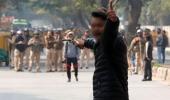The Preamble to the Constitution of India, invoked again and again at the Duck Pond protests, continues to give protestors hope about a better future, despite the dark scenes all around, notes Mohammad Asim Siddiqui.

Shaheen (falcon in English) is a bird of prey, known for its swiftness, intensity and above all its independent and indomitable spirit.
Embodying her characteristics, the brave women of Shaheen Bagh have demonstrated an indomitable spirit, inspiring new Shaheen Baghs in a number of cities.
As against the falcon, a duck is known for its poise, gentleness and lazy elegance.
However, even though there are expressions like 'sitting ducks' in English language, the duck also loves her independence.
The duck is a bird which can walk on land, swim in water and never tires from her attempts to fly.
She loves her freedom as does any actual or potential protestor against the CAA-NPR-NRC.
On the way out of Aligarh Muslim University, one passes by Duck Pond, a prominent university spot flanked on both sides by a forked university road.
This patch of lush green gives passersby a breather as they move into the impressive buildings of the university painted in terracotta.
Duck Pond is an oval island with an abundance of small trees and shrubbery.
A tiny bridge arches over a little pond in the grassy knoll.
Ducks amble about peacefully in this nook under a pillar with AMU founder Sir Syed Ahmad Khan's last message which acquires a new meaning in a new context: 'My vision never dimmed. My determination never failed. I built this institution for you, and I am sure, you will carry the light of this institution far and wide till darkness disappears from all around.'
Perhaps to carry the light of the institution far and wide, their determination also not dimmed, it was the students of Aligarh Muslim University who first started the protests against CAA from where they reached other towns and cities.
There are two prominent sites of protest at AMU.
Babe-e-Syed, the gateway to the university leading to different departments of studies, had been the site of many protests, both against the university administration on local issues and the government and other organisations on some national and international issues.
Recently, a Allahabad high court order directed the Aligarh district magistrate and SSP to ensure that nobody was permitted to hold a demonstration, dharna or rally 'either at the main gate of the administrative block of AMU or within a 100-metre radius of the block and the VC's lodge.'
But since protest in a democratic manner is the fundamental right of everyone the university thought it fit to earmark a particular site on the campus for protests.
Situated at the trisection of the Science, Engineering and Arts Faculty, with the university canteen close by, Duck Pond has been officially designated by the Aligarh Muslim University as the site where students can gather for democratic protests.
While students have been sitting on a dharna for more than a month close to the Bab-e-Syed, the AMU Teachers Association lent its support to them by organising some protests. Some concerned teachers at the university started a regular protest on the Duck Pond from January 1.
Their protest starts every day at 6.30 pm and ends at 7.30 pm, but not before a speaker makes a short speech on some national issue, mostly on some aspect of the CAA.
It is always a mixed group of teachers, young and old, men and women, Muslims and Hindus, occasionally joined by a group of students and even some retired teachers.
Their protest, accompanied by a candlelight vigil, concludes everyday with the University Tarana, written by the progressive Urdu poet Asrarul Haq Majaz (1911-1955), followed by the National Anthem.
Academics, intellectuals, poets and writers have addressed the gatherings on a range of issues ranging from different aspects of the CAA, NPR and NRC to issues in higher education, attack on educational institutions, and police brutality across the country.
The protest has also paid homage to Rohith Vemula on his fourth death anniversary, traced the history of the Azaadi slogan and focused on the use and misuse of the law of sedition.
While the revolutionary Urdu poetry of Faiz Ahmad Faiz, Josh Malihabadi and Habib Jalib has been the dominant flavor of the protest, poetry in Hindi and English has also been recited by many speakers.
There has also been a release of a book Poetry of Belonging (Oxford University Press) by Ali Khan Mahmudabad in solidarity with the protests against the CAA,NRC/NPR.

The discussion at the Duck Pond has been enriched by Machiavelli's emphasis on rule by fear rather than love, Marxist reading of history and economy, John Stuart Mill's idea of liberty and most importantly, Dr B R Ambedkar's inclusive vision of India.
Reading of relevant passages from books and articles has contributed to the intellectual flavor of the protest.
The often unstated relationship between democracy, secularism and rationalism has been emphasized sufficiently as also the horror of the tyranny of the majority expressed in no uncertain terms.
In the same way, the ideology of fascism has been attacked by speaker after speaker.
Importantly, the teacher protestors have raised their voice in Constitutional terms, not falling into the trap of a separate Muslim identity or focusing too much on Muslim victimhood.
Like, in other recent protests the reclaiming of national symbols and breaking of stereotypes have been on display in the protests of AMU students and teachers.
Women, many wearing scarfs or burkhas, living the very idea of democracy, have come out at the Duck Pond in large numbers.
The most beautiful sight in the gathering is that of children holding the Tricolor in one hand and a candle in the other and singing melodious patriotic nazms.
Pictures of Gandhi, Ambedkar and Sir Syed Ahmad Khan, the founder of the university, pasted on the pillars, add to the symbolism.
Most importantly, the Preamble to the Constitution of India, invoked again and again at the Duck Pond protests, continues to give protestors hope about a better future, despite the dark scenes all around.
Mohammad Asim Siddiqui teaches English at Aligarh Muslim University.











 © 2025
© 2025